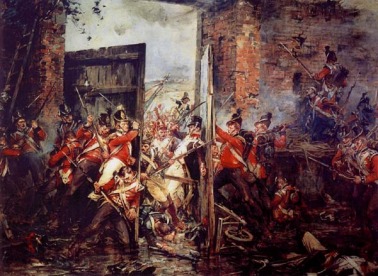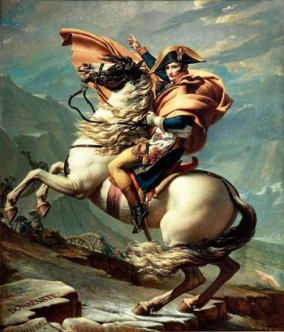NAPOLEON’S DOWNFALL
Absolutism rose once again as Napoleon Bonaparte rose to power. But three main reasons arose to bring down his dictatorship starting in 1806, to permanently bring down any absolute power in France ever again. Such events consisted of the Continental System, the Peninsular War, and the Hundred Days.
The man who failed it all.
Bibliography: http://www.canadiangeographic.ca/Atlas/Images/Glossary/Napoleon_Bonaparte.jpeg
1) Continental System: DÉJÀ VU?
To weaken his arch rivals, the British, Napoleon made efforts to weaken their economy by setting up a blockade against Great Britain. With his navy, Napoleon closed all ports and prevented any trade or communication with his enemies from entering the empire. However, Napoleon’s navy forces were spread out too much, and easily let in smugglers supported by the British. Though this did weaken the British in their commercial and industrial economy, it did not completely collapse their foundation. The British also responded with a blockade of their own, and because they had the most advanced and best naval fleet in the world at the time, their blockade was much more effective than the French blockade. This failure led to many other issues such as the Peninsula War, and the questioning of Napoleon’s authority over his own country.
2) GUERRILA ATTACK!
In 1808, Napoleon sent an army to Portugal who was not cooperating with his efforts made in the Continental System. Napoleon wanted to send his forces in through Spain, however, the people protested. Thus, Napoleon placed his own brother, Joseph Bonaparte, on the throne to make this possible, however, it only outraged the Spanish people more. The Spanish thus attacked the French armies in Spain through a series of guerrilla attacks for six years. Napoleon was used to fighting against large forces on the battlefield, so he was inexperienced in such tactics and how to defend himself. He lost 300,000 men in the Peninsular War.
3) His Last HUNDRED DAYS...

The last mistake that Napoleon made completely brought down his rule in the French Empire. After foolishly chasing the Russian army all the way to Moscow and losing about 410,000 soldiers to the Russian scorched-earth policy, Napoleon still managed to raise an army though not as experienced as his previous army.The army did him no good – Allied forces easily defeated him in 1813, right outside of Leipzig, a German city. Slowly, Napoleon was being pushed towards the capital of Paris by the allied forces, and eventually was forced to surrender to Frederick William III of Prussia and Czar Alexander I of Russia. Napoleon was banished to Elba, off the coast of Italy.
The British defending Waterloo against the French.
Bibliography: http://www.britishbattles.com/waterloo/images/hougoumont/hougoumont-doors-600.jpg
Louis XVI became the new monarch in France, but very quickly grew to be unpopular. Hearing this, Napoleon escaped from Elba and returned to France in order to regain power, and was celebrated by his return. Napoleon rose yet another army in a matter of days, and attacked the village of Waterloo in Belgium, where the British forces awaited at the lead of the Duke of Wellington. The British defended the village until the Prussian army came in support. For another two days, the two armies chased the French off the battlefield and into surrender. Napoleon was then shipped to St. Helena and died in 1821

